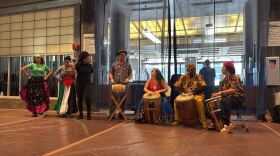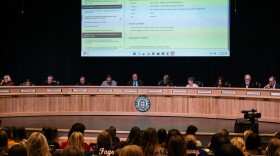Given a chance to gut the nation's 44-year-old Voting Rights Act by declaring unconstitutional federal monitoring of election practices in places that have historically discriminated against blacks, the U.S. Supreme Court surprised many and punted Monday.
And in doing so, the justices disappointed many conservatives but managed to avoid triggering — at least for now — a divisive national debate over how far the nation has traveled in overcoming the racism that infected its election system.
"This just kicks the can down the road," says Jan Witold Baran, a Washington campaign and elections lawyer and former counsel to the Republican National Committee.
A Small Change To Act
In a decision involving a small Texas utility district, the justices avoided ruling on the constitutionality of a provision of the 1965 Voting Rights Act. The provision requires ongoing federal oversight of election practices in jurisdictions that historically discriminated against African-Americans.
Instead, in an 8-1 decision, the court ruled narrowly that the Northwest Austin Municipal Utility District No. 1 is eligible to simply apply for an exemption — or a "bailout" — from that controversial oversight requirement, which Congress has largely imposed on all or parts of Southern states.
The decision is being widely interpreted as an effort by Chief Justice John Roberts, who wrote the majority opinion, and other justices to avoid a split decision that had the potential to overturn strongly supported, bipartisan congressional action.
"This is a political decision in the best sense of the term," says Nathaniel Persily, law and political science professor at Columbia Law School. "This was all about whether the court wanted to avoid the headlines and fallout from striking down the most effective civil rights law in the U.S. Code."
In writing the decision, Roberts acknowledged what he termed the "federalism concerns" that Section 5 of the Voting Rights Act triggers by requiring that targeted state and local entities get federal "pre-clearance" if they want to amend their election laws.
But as to that question of federalism — the balance of power between the federal government and the states, and the difficult constitutional issues it raises, Roberts wrote, "We do not answer today."
The chief justice noted the "undeniable" accomplishments of the act in improving African-American voter registration and election participation.
Monitoring Still Needed?
Monday's decision came as a surprise to some court watchers who have seen Roberts as long critical of the act. He argued against an expansion of the act as a young lawyer in the Reagan administration, and opposed the extension of the act that President Reagan eventually signed.
In Monday's opinion, Roberts wrote that the federal oversight was intended to be temporary. Congress has extended it four times, most recently in 2006 for 25 years. And he said that "the evil that [Section 5] is meant to address may no longer be concentrated in the jurisdictions singled out for pre-clearance."
David Bositis, an expert in national black electoral politics at the Joint Center for Political and Economic Studies, cited Roberts' antipathy toward the tenets of the Voting Rights Act.
It's his theory that the chief justice failed to convince the court's swing vote, Justice Anthony Kennedy, to join him and other conservatives in tackling Section 5.
"I do not think that there was any prospect that he was going to bring Anthony Kennedy along, and given that, he didn't want to be on the losing side of the decision," Bositis says.
"In this particular decision, I suspect that Chief Justice Roberts wanted it to be as narrow as possible to avoid a resounding affirmation — which could have been the result if someone else had written the decision," he says.
Recent Racist Incidents
Bositis also argues that documented acts of racism that have emanated from Southern Republicans since the election of President Obama may also have informed the court's decision.
In recent weeks, an aide to a Republican Tennessee lawmaker e-mailed widely a collection of presidential portraits; in the spot where Obama's portrait should have appeared, there was just a pair of white eyes set against a black background. In South Carolina, a former GOP official referred to a gorilla that escaped from a zoo as an "ancestor" of first lady Michelle Obama. Also in South Carolina, a Republican operative said that Obama planned to tax aspirin because "it's white and works."
"Some people were saying after Obama got elected that now we don't need these voting rights rules," Bositis says. "The justices, or their law clerks, have no doubt heard the reports of these disgusting racial attacks on the Obamas."
Decision With Narrow Effect
Persily is among those surprised that the court didn't tackle the constitutional issue. He was in the courtroom when the justices heard oral arguments in the case earlier this year, and said Roberts aggressively questioned the need for the Section 5 provision, and that Kennedy seemed skeptical of the pre-clearance requirement.
"I thought they were going to strike down Section 5, and I consider today's decision a pretty statesmanlike move," Persily says. "Not only is the decision narrow, but it will have little effect."
The bailout provision had already been available to more than 12,000 entities that register voters. But since 1982, only 17 had applied to be removed from oversight, citing proof of a decade free of voter discrimination.
Under Monday's court decision, the ability to apply for bailout will be available to entities like the Texas utility district, which holds member elections but doesn't register voters.
"The decision simply creates opportunities for jurisdictions like [the Texas utility]," says Baran, who has argued four election-related cases before the Supreme Court.
More Test Cases To Come
Controversy over the constitutionality of Section 5 will not just disappear, and the justices will no doubt watch as other test cases move through lower courts.
"It's going to come back — and, in some ways, delaying the resolution of this issue poses special dangers," Persily says.
His concern: that the high court will be asked to resolve the Section 5 issue in the heat of the highly politicized congressional redistricting that will take place in 2011.
The sole dissenting vote in the case came from Justice Clarence Thomas, the court's only African-American member. Thomas argued that the nation had moved beyond its need for the Section 5 pre-clearance requirement.
The "violence, intimidation and subterfuge that led Congress to pass [Section 5] and this Court to uphold it no longer remains," Thomas wrote in his dissenting opinion. "An acknowledgment of [Section 5's] unconstitutionality represents a fulfillment of the Fifteenth Amendment's promise of full enfranchisement and honors the success achieved by the [Voting Rights Act]."
In pushing the constitutional decision down the road, the court Monday signaled that it was not ready to accept Thomas' assessment — or at least accept the political fallout that adopting his opinion would have wrought. But conservatives say more challenges are on their way.
"We look forward to these future challenges," says Roger Clegg, president of the Center for Equal Opportunity, "and to the court's correct resolution of them."
Copyright 2022 NPR. To see more, visit https://www.npr.org. 9(MDAzMjM2NDYzMDEyMzc1Njk5NjAxNzY3OQ001))






